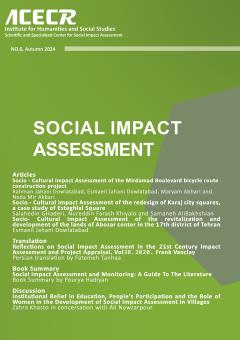Institutional belief in education, people's participation and the role of women in the development of social impact assessment in villages (interview with "Dr. Ali Nouzarpour")
Subject Areas :
1 - Ph.D in Cultural Sociology, Mazandaran University
Keywords: Institutional belief in education, people's participation and the role of women in the development of social impact assessment in villages ,
Abstract :
If one of the ways to achieve sustainable development is rural development, preservation of natural, local and human resources and capital, social impact assessment can be an important step in facilitating this. Evaluation of social impacts as one of the elements of knowing the social, cultural, environmental, economic and local conditions can facilitate the development in the villages with the participation of the residents of the villages and lead to the institutional empowerment of the villagers and villages. In this issue, to investigate the role and obstacles of social impact assessment in the development and empowerment of rural people, we went to Dr. Nozarpour to use his opinions and experiences. Dr. Nozarpour has a bachelor's degree in sociology and a master's degree and a doctorate in urban planning. He started his career in the Ministry of Interior in 1370 in the field of urban and rural development and worked in the same field until his retirement. At one point, he was the general manager of the planning and construction office and was responsible for all municipal affairs in the country in the fields of planning, policy making, studies, research and education, distribution of resources and technical support. At one point, he was responsible for the establishment of rural cooperatives in the country, and from 1382 to 1384, he was the deputy for the establishment of rural cooperatives in the municipal organization. Before his retirement, he worked as the mayor of Tehran's 22nd district in the municipality for three years. Dr. Nuzarpour considers the political structure and the managers' vision of education in the rural sector to be one of the obstacles to the implementation of the social and cultural impact assessment in the rural sector, and he believes that one of the problems of the rural sector is the lack of sufficient information about social capital. It is local, environmental, and human, and social and cultural attachments can, with the support of managers, lead to more knowledge of the villages and attract the participation of the villagers in the matter of development. In the following, you will read an interview with him. نماد «مورد تأیید انجمن»
.

